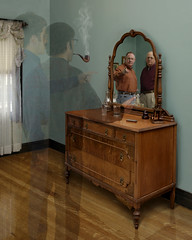“I did this before.”
“This already happened.”
These are statements of memory. And a neural circuit explanation of déjà vu runs like this: a hyper-activation of the parahippocampal gyrus (now, don’t worry about what that exactly is, just enjoy the poetry)… a hyper-activation of the parahippocampus… gives rise to feelings of familiarity, a type of memory. Then, a normally functioning prefrontal cortex and hippocampus kick in to report “no content” in episodic memory. Thus, arises déjà vu. “Nothing there” in memory means it cannot be. But, it still seems very familiar. It’s a simple malfunction as two different types of memory are out of sync.
But, I’d like to drop the neurological and stick with just the warm and fuzzy world of memory per se. For, it seems to me that meditation itself can be approached almost entirely through the lens of memory. So, I’ve been thinking about memory for some time.
Meditation seems to bring up all kinds of memories. Novices sit to meditate and think about what happened in the day. More advanced practitioners often stir up traumatic memories from childhood. And of course, meditators are big believers in reincarnation. They’ll tell you all kinds of stories of what they’ve recollected. Do we really have memory back that far? And finally, Enlightenment itself is sometimes couched in terms of a wonderful sense of finally “coming home.” Is this just another version of familiarity, a memory writ large by hyper-activation of the parahippocampal gyrus?
Can many, if not most, experiences of meditation be ascribed to dysfunction in memory? I think it’s worth consideration.
First, it’s good to realize that there are many kinds of memory. Classification schemes abound. Based upon duration, there are three distinct types of memory: sensory, short-term, and long-term memory. Working memory, a type of the short-term, is defined not by duration but rather purpose.
Long-term memory encompasses both declarative (explicit) and procedural (implicit) memory. Declarative memory requires conscious recall and can be further sub-divided into semantic memory (which concerns facts independent of context) and episodic memory (which concerns information specific to context.) This includes personal memories, sensations, and emotions. Brain regions such as the hippocampus, the amygdala, and the mammillary bodies are involved in these different types of memory.
On the other hand, procedural memory (or implicit memory) doesn’t depend on conscious recall, but rather on implicit learning. It is used primarily in learning motor skills and is revealed by improved performance of a task after repetition. "Practice makes perfect" as we unconsciously learn by previous experience. Procedural memory depends upon the cerebellum and basal ganglia.
In the lab, each of these types of memory are separate functional units. One can be manipulated without affecting the function of the other. And too, notice that this whole scheme still leaves out at least two types of memory: familiarity and prospective memory (i.e. remembering to remember). So, even this complicated a scheme isn’t the whole story of memory, but it gets me to my point:
What this suggests to me is that memory, like reading glasses, telescopes and microscopes, comes in many forms suited to different functions. And while I think that déjà vu may actually be simply a memory malfunction, certain experiences in meditation may not. Neither dysfunctions or hallucinations, the memories uncovered during meditation may actually be hints that there is more to Reality than what the general consensus believes. Perhaps we have yet to uncover the full power and scope of human memory capacity.
What’s needed is veridical evidence. I'll suggest some things another day. For now, I would simply like to encourage the young scientists out there stay open to possibilities. And start looking not “out,” but “back and in.” It may well help us address the long denied Hard Question.


No comments:
Post a Comment